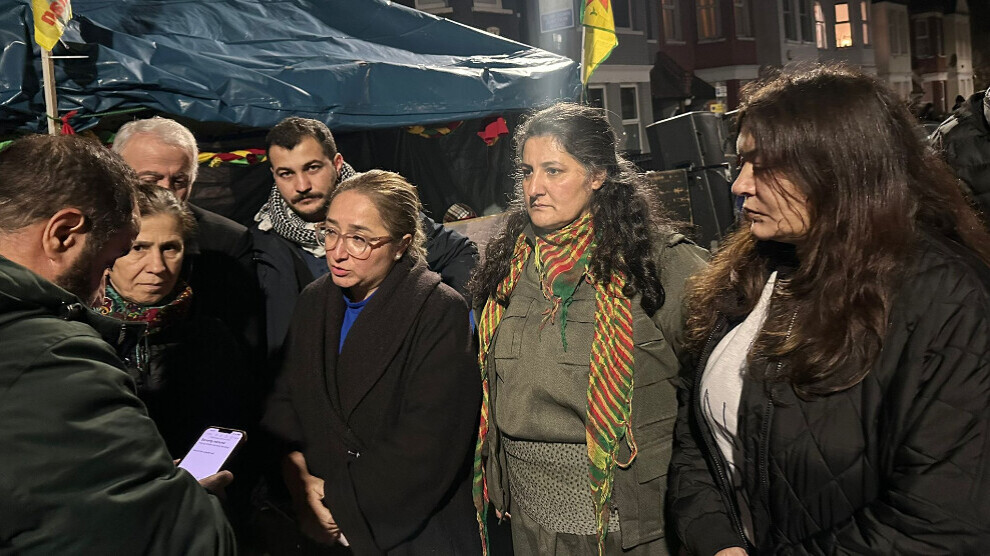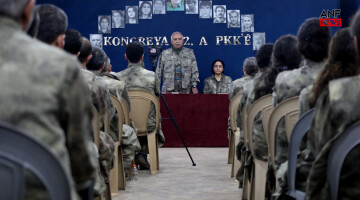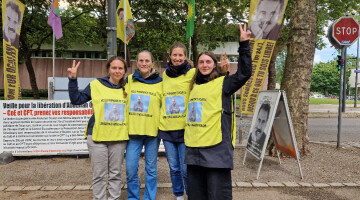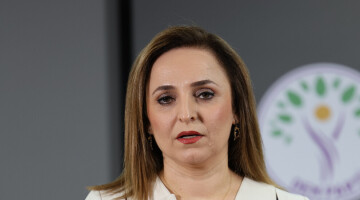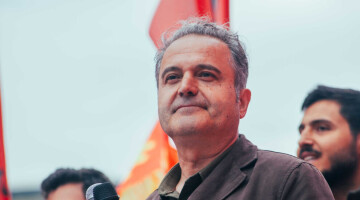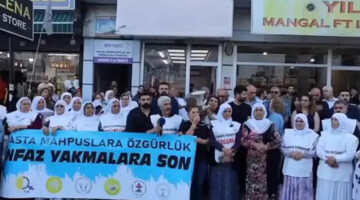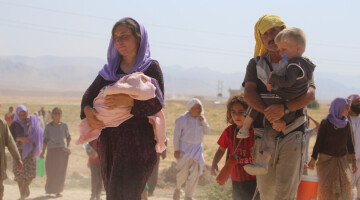The Kurdish activists detained in London a week ago are still in police custody. On 27 November, seven Kurds were detained under British anti-terrorism legislation during raids on the Kurdish Community Centre (KCC) and the homes of Kurdish patriots. The period of detention has been extended until 9 December. Those detained in the ‘anti-terrorist operation’ in London are accused of having links to the PKK.
The people detained in London are Türkan Budak, co-chair of the Kurdish People's Council in the UK, Kurdish politician and author Ali Poyraz, and activists Ercan Akbal, Agit K., Berfin K., Mazlum S. and Doğan K. The detained activists are on a hunger strike in protest against the operation and are exercising their right to remain silent. Their apartments were occupied by the police for days. Most recently, the police withdrew from Ali Poyraz's apartment, and the family was able to return after five days. The police left the door broken open when they left the apartment. Ali Poyraz has already spent over twenty years in prison in Turkey.
The Kurdish Community Centre (KCC) in the Haringey district is still sealed off by the police. It is not known when or if the building will be opened. A permanent protest is taking place in front of the cordon. Demonstrations are held every day, also addressing the Islamist campaign in Syria, which is supported by Turkey. The activists Beritan Silemani and Devrim Sara have started an indefinite hunger strike, with other activists taking part in the hunger strike for three days at a time. The protest tent is visited by hundreds of people in solidarity.
Accompanied by a delegation, Britain's first Kurdish and Alevi MP Feryal Clark Demirci, Parliamentary Under-Secretary of State for AI and Digital Government, visited the hunger strike tent Tuesday evening. Demirci, who chatted with the hunger strikers and the activists in front of the institution under police blockade, said that they are following up the issue sensitively and have taken various initiatives in line with the concerns of the society after the operation.
Feryal Clark Demirci said that three meetings were held with senior police officials, municipal representatives, MPs from the North London region and representatives of community associations. “In these meetings, both we and our community representatives expressed our concerns about the methods of the police. We informed them that the use of police officers from the Turkish Police Association during and after the operation means not understanding the sensitivities of the community. We expressed our demand for our local municipalities to show sensitivity on the issue. We held meetings with the Ministry of Police and Security and the Ministry of Interior to express the sensitivities of our society. I will also meet with Home Secretary Yvette Cooper on the issue. We are currently waiting for a response to our request to hold a session on the issue in Parliament as APPG, where all parties are represented.”
Clark Demirci stated that she considered the use of Turkish police officers affiliated to the British police force during the operation as a complete insensitivity and failure to understand the sensitivities of the society, especially considering the developments in Rojava, and added: “I would also like to express my concerns that the attacks disrupt the social integrity and damage the security feelings of our society.”
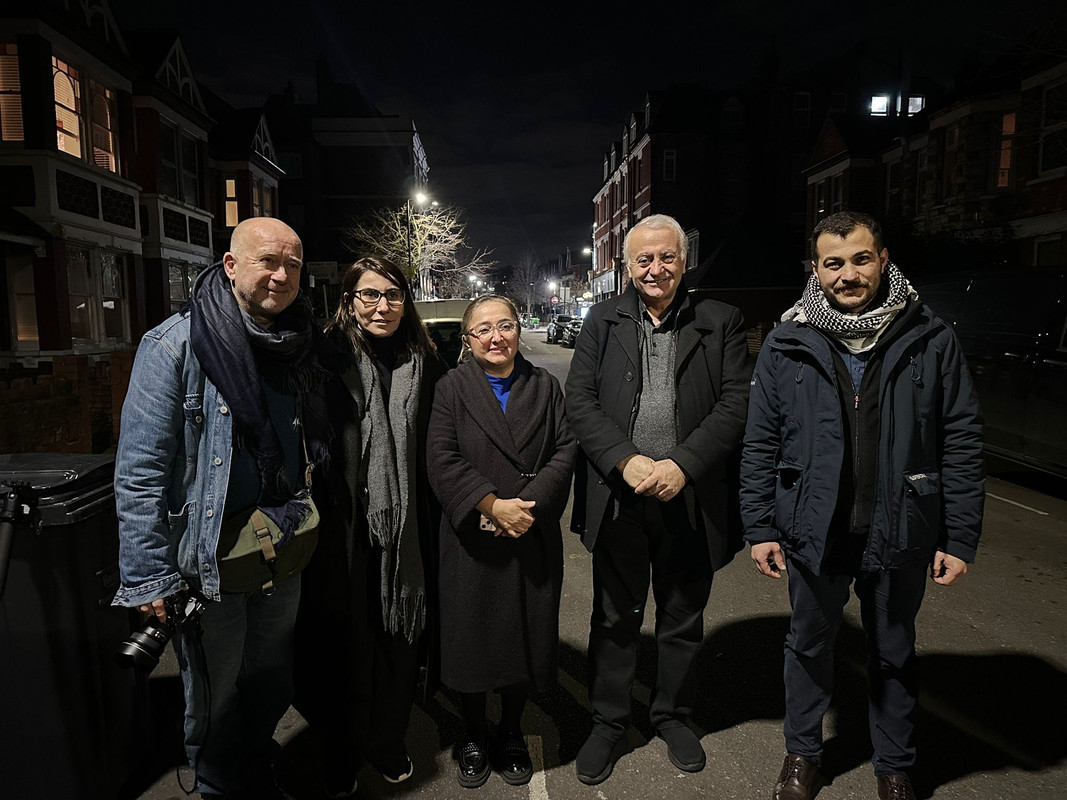
Kurdish politician Osman Baydemir, former mayor of Amed (tr. Diyarbakir), stated during his visit that the people's heads were held high because of their honourable stance and that those who demanded this operation wanted to criminalise the Kurds' just struggle. Pointing out that the Kurdish people in Rojava are under the threat of genocide, Baydemir said: “We are not a criminal people. We are a people who only want freedom and peace. We will not give up our cause until we are free. It is the right way and we will not give up our rights. In Rojava, 500 thousand civilians are at risk of massacre. These civilians are surrounded by the Turkish state and ISIS derivatives. This is a great risk. We have to draw the attention of the whole world to this. This is not Kurdistan. This is not our country. It is not the country of our grandfathers and ancestors. Our country is currently under occupation. Let's not forget this fact while carrying out our work. Our anger is directed against those who keep our country under occupation. We should show our anger and reaction to the occupiers. We are guests here. This is not our country.”
Revolutionary Youth Movement members also organised an event in front of the hunger strike tent and protested the occupation and detentions.
Speeches on behalf of the youth representatives emphasised that the Kurdish Community Centre, which weaves the culture of common life in diaspora conditions and is the home of the Kurdish people, will continue to be defended and protected under all circumstances. Noting that the fascist Turkish state and its barbarian gangs have launched a new wave of attacks in Rojava in order to out the Kurdish people to genocide and destroy their gains, the Revolutionary Patriotic Youth stated that these attacks are attacks against humanity and invited all peoples to a joint struggle against these attacks.
On the other hand, a meeting was held with Labour MPs Kate Osamar, Bambos Charalambous, Enfield Mayor Ergin Erbil, Haringey Mayor Peray Ahmet, councillors, civil society organisations, Haringey and Enfield Police Chiefs and senior police chiefs regarding the occupation of the Kurdish Community Centre. It is reported that activists attending the meeting expressed concern about the police occupation of the KCC and asked the police to evacuate the building immediately. According to reports, the police did not indicate a date for the evacuation of the building.
Discussions on the political process are being held in the tent. Kurdish writer İlham Bakır, who participated in the discussions here, evaluated the latest developments in Rojava and said, “The war against the Kurdish people in Rojava and the Middle East is the product of the same mentality as the attacks here. The same mentality organises these attacks. This is a war between the forces of democratic civilisation and the forces of capitalist civilisation. It is very clear that those who resist will win this war. We will win and we will definitely take back our institution. But right now our eyes are on Rojava. This resistance of ours is also the resistance to defend Rojava.”
In addition to the hunger strike tent in front of the KCC building, the Kurdish People's Assembly is also carrying out intensive diplomatic work. The Crisis Desk, formed by Kurdish activists and friends, has prepared reports on the criminalisation attacks against the Kurdish Community Centre and the destruction caused by the attack. The reports were sent to the headquarters of the Labour Party, Conservative Party, Liberal Democrat Party, Scottish National Party (SNP) and MPs, and a parliamentary question was requested. The letters, which were also sent to the Prime Minister Keir Stamer and the British Foreign Secretary David Lammy, pointed out that the repression and violence used was a painful reminder of the oppression the Kurdish people have faced for generations.
The letters stated that the Kurdish community had been forced to flee Turkey and seek refuge in Europe due to state-sponsored persecution and denial of their fundamental rights, and that the UK is trying to criminalise the same Kurdish community today. Requesting a parliamentary research motion, the letters contained the following demands;
Immediate end to the unjust criminalisation of the Kurdish community in the UK,
A full and independent investigation into the conduct of the police during the operation against Kurdish Community Centre,
A transparent explanation of the actions taken,
Investigation into the level of co-operation between the Turkish state and the British state,
Examination of whether these raids were carried out under pressure from the Turkish state,
Immediate release of all individuals detained in the raids, including the Co-Chair of the Kurdish People's Assembly,
Reopening of the Kurdish Community Centre, which is vital for thousands of our vulnerable community members.

